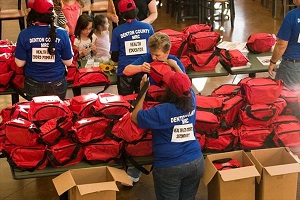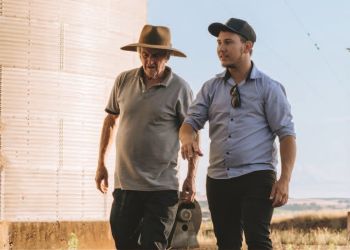 By Julie Looper, Senior Program Analyst, NACCHO
By Julie Looper, Senior Program Analyst, NACCHO
The following post was originally published on NACCHO’s Preparedness Brief blog. For more preparedness news and information, visit http://www.nacchopreparedness.org.
Medical Reserve Corps (MRC) partnerships with state and local officials provide key support to public health and emergency response services. The need for these partnerships to expand and strengthen is likely to increase as communities face ongoing budgetary declines and increasing demands on resources. Understanding the characteristics of these partnerships will help to identify where and how assistance can be provided to initiate and support MRC units and can also have the potential to influence policy and strategic decision-making from the local to federal level.
In fall of 2014, NACCHO began a study of state and local health and emergency management officials’ perceptions of the MRC network, what partnerships exist, why they may not exist, and how best to strengthen those relationships.
Focus groups were conducted at three national-level meetings and conferences. NACCHO designed the focus groups to understand the perspectives and opinions of the MRC from emergency management professionals and health officials. A total of 24 individuals from local and state health departments and local and state emergency management participated in the focus groups. The focus groups provided information about actual conditions and situations across the country directly from those stakeholders.
Based on the results of the three focus groups, NACCHO developed the 2015 MRC Stakeholder Survey. This provided base-level data on existing partnerships with local MRC units, including strengths and challenges of these relationships. All fifty states and the District of Columbia provided input, as did the territories of Puerto Rico, Guam, the U.S. Virgin Islands, and American Samoa. A total of 210 individuals responded to the survey; 141 represented local and state health departments and 49 represented local and state emergency management.
Findings from the Stakeholder Survey and the data from the focus group interviews show very similar relationships between MRC units and stakeholders. A majority of the identified strengths and challenges are also similar and are found across units and jurisdictions. While information was gathered from as many stakeholders that would participate in the study, the results may not accurately depict the entire MRC network.
Current Relationships
Nearly 80% of those surveyed have an MRC unit in their jurisdiction. While MRC Units vary in the relationships with their community partners, the majority of MRC units are partnering and serving alongside colleagues.
The data from the survey is organized into three specific areas: public health promotion, public health preparedness, and emergency response. When asked how often organizations partnered with the MRC in the past with regards to those areas, the following information was found:
- Public Health Promotion – the majority of survey respondents (70%) have partnered with their local unit at least once a year
- Public Health Preparedness – the majority of survey respondents (84%) have partnered with their local unit at least once a year
- Public Health Emergency Response – 70% have partnered with their local unit at least once per year
The 2014–2015 Stakeholder Study serves to show that stakeholders that partner with local units and utilize MRC volunteers are the MRC’s biggest champions. By engaging these partners and growing and developing the program, the MRC will continue to evolve and better prepare communities across the country.
“Each jurisdiction in our state has a different take on the use and construct of their MRC. The flexibility of the program allows the locals to use these volunteers as they see the best fit,” said one survey responder. While each MRC unit may differ in their specific mission, each unit serves their respective jurisdiction to improve the health and safety of their communities. According to survey responses, the most important service that an MRC provides is public health preparedness and public health emergency response.
- Nearly all responses (96%) felt that preparedness and emergency response were identified either as important or very important for an MRC to provide in their respective jurisdiction.
Outside of public health preparedness and response, public health promotion activities followed closely behind.
- Seventy-eight percent of respondents felt that these activities were either important or very important to provide.
Over the next several weeks, data from the 2014–2015 MRC Stakeholder Study will be shared through the NACCHO Preparedness Brief blog. The blog will discuss the effectiveness, importance, and reliability of the MRC network and will detail the specific strengths and challenges survey respondents and focus group participants have experienced.








